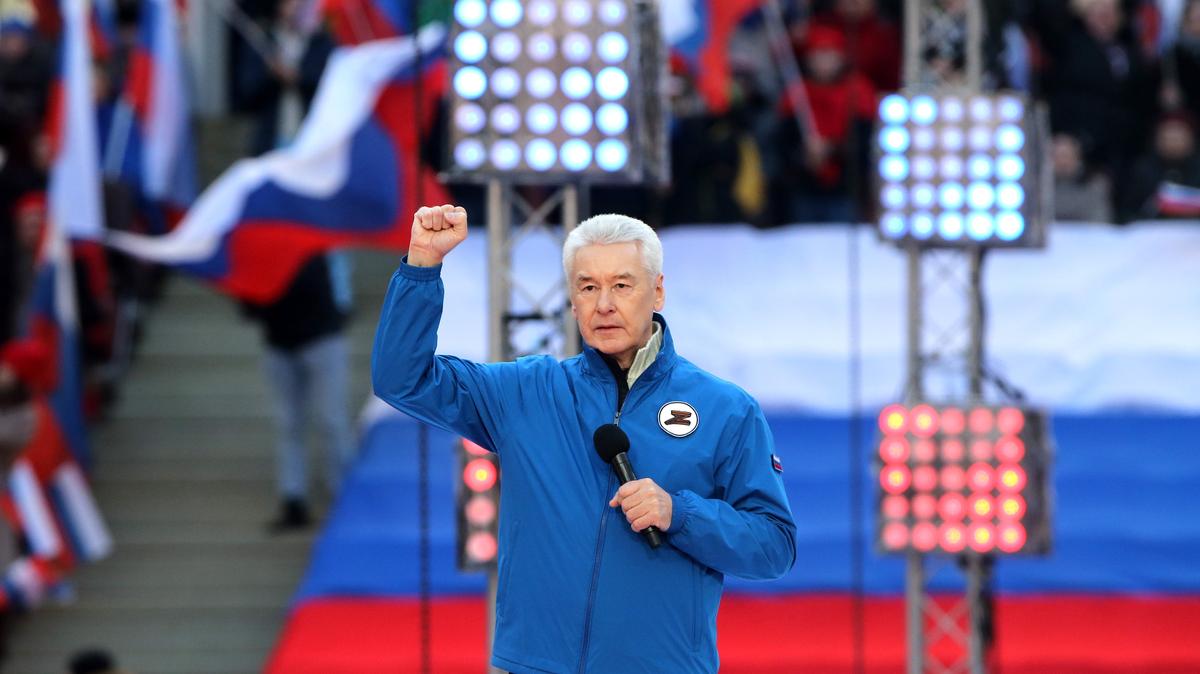There is a popular observation in Moscow’s circles: throughout almost the entire course of the war in Ukraine, mayor Sergey Sobyanin has tried to distance himself from it. In the first months of the war there was no patriotic war fever in the capital, and only on a few buildings could the letter Z could be found.
Even after the mobilisation announcement, Sobyanin tried to minimise its impact on the city: according to official data, fewer men were drafted from the capital per capita than from other regions, and Moscow “paid off its debt” by sending labour migrants to the war.
However, in the war’s tenth month, Sobyanin himself travelled to the “defensive line” and met with the soldiers from Moscow there. And New Year’s decorations throughout Moscow are accented with festive Z-symbolism.
Novaya Gazeta Europe tells the story of the capital city mayor’s attempt at dodging the war, and how this escape endeavour ultimately concluded.
Since the beginning of the war, Sergey Sobyanin — like Prime Minister Mikhail Mishustin — was among those members of the Russian political elite who tried to disassociate from what was happening in Ukraine, speaking nothing about it publicly.
In contrast to former president Dmitry Medvedev, whose statements on the continuation of the war have become both more radical and more bizarre (let us not forget his take on “the war with satanists”), the mayor of Moscow spoke no harsh words.
Only twice did Sobyanin comment on the war — generally getting away with it by using pretentious and insincere wording. The first time was in a March meeting with Putin regarding measures for socio-economic support for the federal subjects of the Russian Federation. “I must say that we all sincerely support the decisions you’ve taken over the conducting of the special military operation,” he said at the time.
Then the mayor of Moscow gave a short speech at a concert at Luzhniki Stadium marking the anniversary of the annexation of Crimea and Sevastopol. “Thank you to the men who, with rifles in hand, are defending the citizens of Donbas, Russian citizens, Russia, and me and you today. Half of the world has turned on us, but Russia is a strong country — strong in its citizens, and strong in its patriots. As long as we are together, we are unbeatable. Long live Crimea, long live Donbas, long live our president Vladimir Vladimirovich Putin, and long live Russia!”
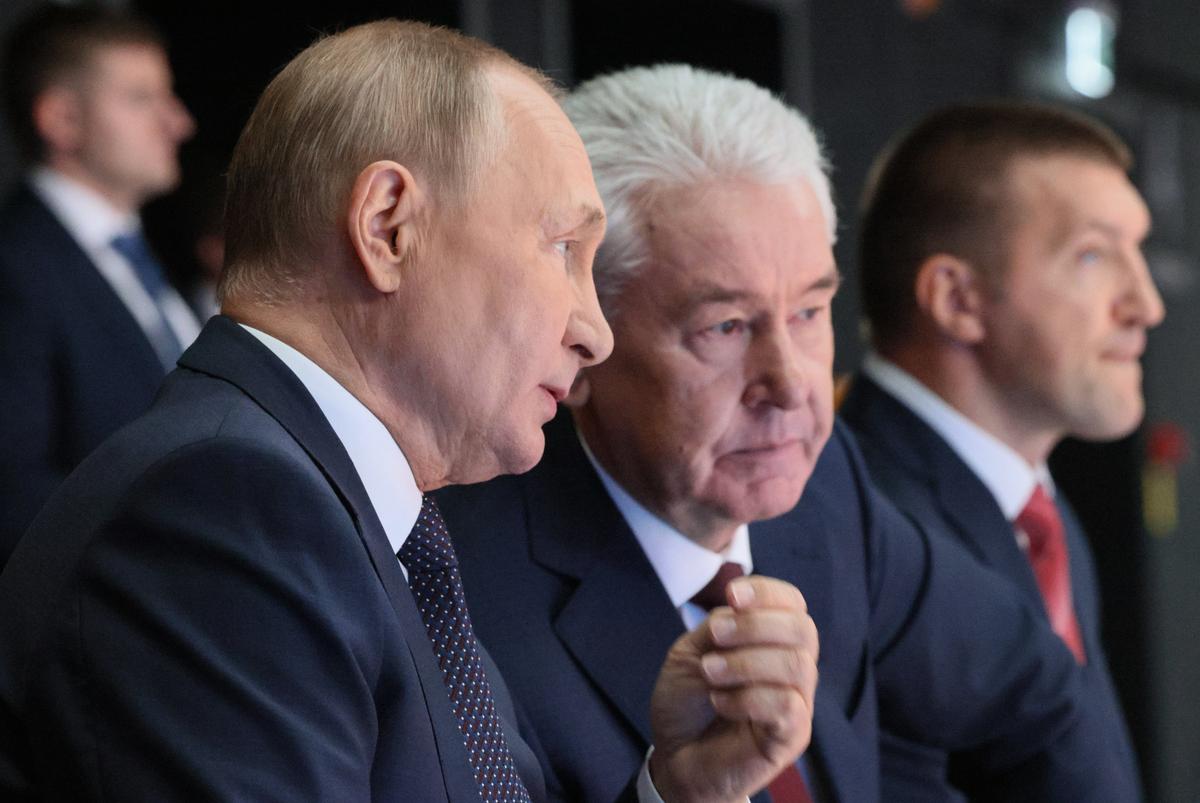
Photo: EPA-EFE / GAVRIIL GRIGOROV / SPUTNIK / KREMLIN / POOL MANDATORY CREDIT
In June, the mayor visited the St. Petersburg International Economic Forum (SPIEF) and signed an agreement of cooperation with representatives of the so-called Donetsk and Luhansk “people’s republics” (“DPR” and “LPR”).
The news website Meduza reported that originally, Sobyanin did not want to do this, “but changed his mind after meeting with Vladimir Putin”. According to the agreement, Moscow will provide “DPR” and “LPR” with socio-economic and humanitarian assistance, helping to restore social, housing and engineering infrastructure to the territories. However, as political analyst Abbas Gallyamov notes,
even here Sobyanin distanced himself from the bloody aspect of the special military operation, focusing attention on “rebuilding” the occupied territories.
“First, Sobyanin as a person is very pragmatic, and he’s infinitely far from all that ideological nonsense, like animosity with America or oppression of Russian speakers’ rights, which formed the foundation of the military conflict. Sobyanin doesn’t like the virtual — he likes real things. This is the heart of the reason for keeping his distance,” explains Gallyamov. “He understood from the very beginning that war is a completely unnecessary venture, which will not lead to anything good. To him it’s stylistically foreign.”
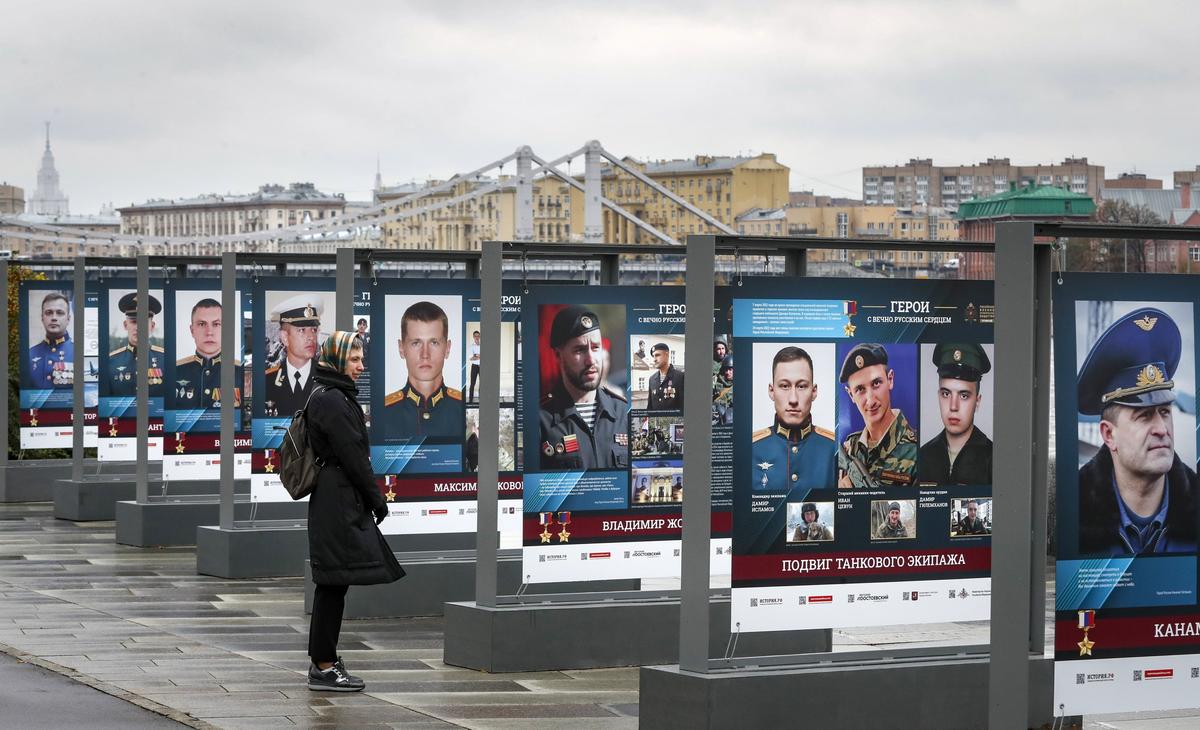
A street exhibition in Moscow showing photographs of Russian soldiers sent to Ukraine. Photo: EPA-EFE / YURI KOCHETKOV
Despite the worsening situation on the frontlines, the mayor of Moscow did not speak about the war all summer, instead purposely occupying himself with “city matters”, such as opening new metro stations or constructing new bridges.
In June, Sergey Mironov, chairman of the Russian political party A Just Russia, complained that Moscow authorities demanded the removal of a banner supporting the war in Ukraine from his party’s office building. In the words of Mironov, the officials explained the demand stemmed from “numerous complaints from displeased citizens”.
“I’m constantly speaking with journalists and volunteers who have come to the capital from the conflict zones. Many of them are surprised that there’s nothing on display in Moscow calling to mind the war that’s deciding the fate of our country. Not one patriotic billboard, not a single portrait of our heroes, no Z’s, no V’s. Now we know this isn’t a coincidence, but the result of thorough oversight by zealous inspectors. Their position is clear: who cares if they’re shooting and killing each other over there? That’s not our problem, all is good here, we’re living as we have lived and we don’t need your special operation,” raged Mironov.
On 21 September, Putin announced the “partial” mobilisation, the framework of which should have called up 300 thousand men. The main burden fell to regions with low potential for protest. It was planned to mobilise up to 16 thousand men in the capital, which, percentage-wise, is less than in many other regions of the Russian Federation.
Analysts explained that it was decided to not take the risk with Moscow, since the capital’s inhabitants are more prone to protesting actions.
“The fact that Moscow is a protest city helped Sobyanin to not give in to pressure from Russian ‘hawks.’ Dissatisfaction towards the war is higher in the capital than it is in the middle parts of the country. This means that if you push this subject too strongly, it will only increase the fervour for protest, and in the end lead to a breaking point, to demonstrations. In Moscow a protest can break out completely unexpectedly. This gave Sobyanin a formal opportunity to stay to off the side. He could just say to Putin anytime they have a conversation: ‘Yeah, sure, I could decorate all of Moscow with Z’s tomorrow. But what if all hell breaks loose?’
“Sobyanin, you could say, is a voice of reason in the Russian state establishment. Although it’s hard to call it a ‘voice,’ because neither Sobyanin, nor Mishustin actually say anything — they just stay silent. But this silence speaks,” says analyst Abbas Gallyamov.
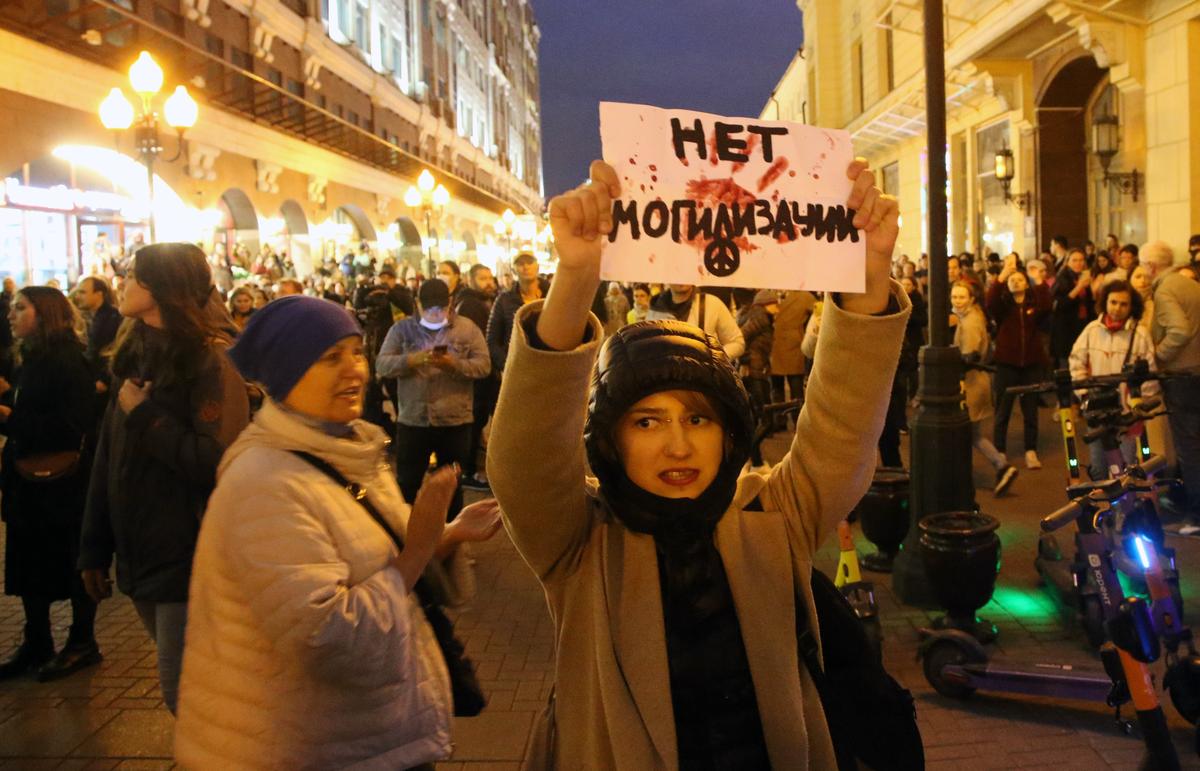
A protest rally against mobilisation. Moscow, 21 September 2022. Photo: Contributor / Getty Images
Of all the heads of the federal subjects of the Russian Federation, the first to declare mobilisation complete in their region was Sobyanin, on 17 October, a week and a half before Defence Minister Shoigu confirmed it.
The head of human rights group “Agora” Pavel Chikov mentioned at the time that authorities of the federal subjects of the Russian Federation do not have the power to end mobilisation, they can only participate in its implementation. Only the president can declare mobilisation complete, which Putin still has not officially done, and the suspension of mobilisation measures is not yet settled through regulatory acts. It is clear that Sobyanin intentionally tried to minimise the negative impact of mobilisation on his personal reputation.
“Sobyanin acted wisely. He has an election next year, and he has managed to intercept the agenda and turn the illogic of the enlistment offices into personal success, being the first to cancel mobilisation.
The discontinuation of partial mobilisation is a clear indication of his concern for electoral ratings,” comments political analyst Ilya Grashchenkov on Sobyanin’s actions.
And yet, be that as it may, war is still war.
On 2 December, Sobyanin publicised his visit to the frontlines. The mayor did not specify exactly which region he travelled to. The mayor also uploaded a post of a visit to a military training centre in Luhansk.
By 15 December, the next mention of the war appeared on Sobyanin’s Telegram channel. This time it was an announcement that Moscow is organising a special holiday programme for “participants of the special military operation and their families” and that 42 thousand children, including those from the occupied “DPR,” “LPR,” Kherson and Zaporizhzhia regions, will be in attendance for the traditional “Mayor’s Christmas Tree” show.
In the same post, Sobyanin mentioned that the majority of those who voted on the format of New Year’s events in the capital “supported festive decoration of the city, but without fireworks or street concerts”.
Up to the end of 2022 there were almost no symbols of war in Moscow, but in December the capital was adorned with the letter Z and patriotic slogans. And by 17 December, 40 sites had opened for the collection of New Year’s presents for residents of the occupied territories and participants of the war.
“All of this tells us that as the number of military setbacks grows and public opinion worsens, authorities are forced to raise the degree of hysteria,” explains analyst Gallyamov on the changes in the capital. “It’s becoming impossible for Sobyanin to continue standing on the sidelines. Because to the remaining military officials, it’s beginning to look like betrayal or defeatism. The mayor has a very strong intuition, he can feel it. And so he’s starting to show his involvement here and there: ‘I’m not trying to stay off to the side.’ In times of war hysteria, like we can see now with Russian authorities, the voice of reason is not heard. I am sure all of this is not by his own initiative. The Kremlin is trying to paint Sobyanin with blood, so that he’s not left wearing a white coat.”
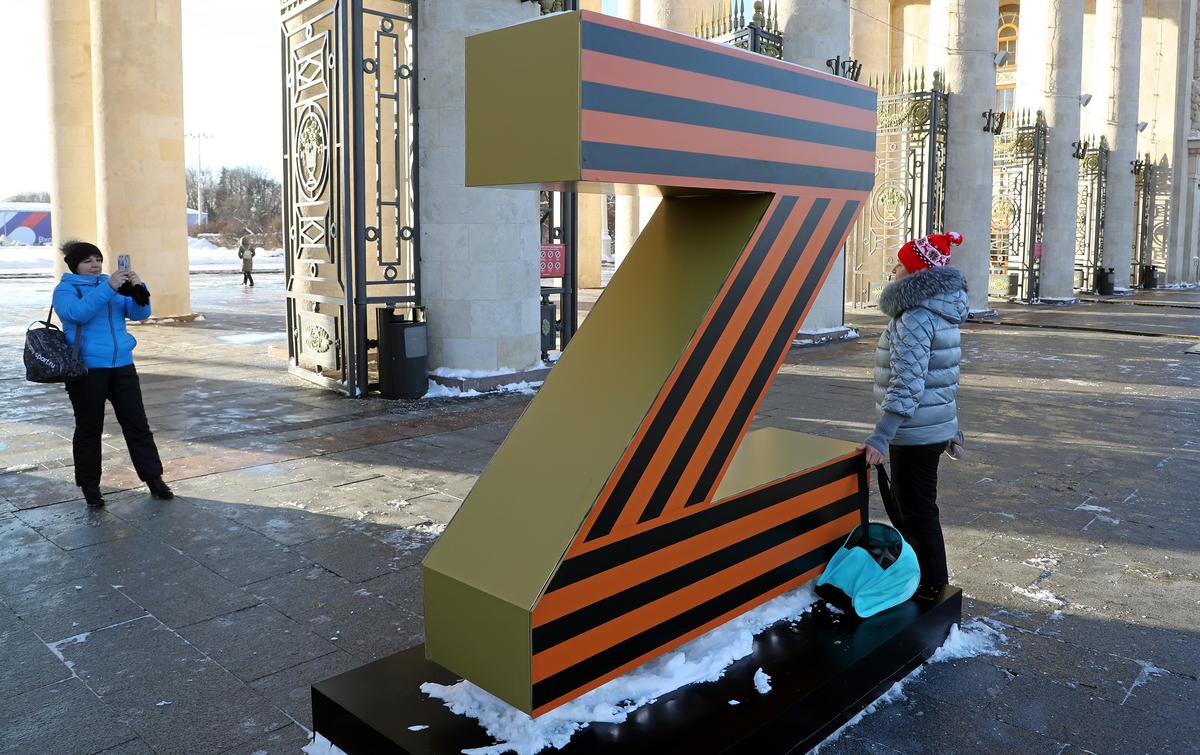
A Z installation in Moscow, 20 December 2022. Photo: EPA-EFE / MAXIM SHIPENKOV
And yet, despite the holiday militarisation, Sobyanin’s behaviour time and time again provokes rumours that this is all just the PR campaign of a person who could become the successor of Putin. Gallyamov notes that Sobyanin is “fending off thoughts of succession”, because he is loyal to Putin:
“He definitely wouldn’t be against it if Putin himself chooses him, but Sobyanin will not push Putin towards this choice. He is too smart and too careful for that. Having said that, objectively, as a voice of reason, he [fits the role of] a successor. He is one of the most serious players of those who are capable of stabilising this situation, that is to say establish a normal dialogue with Ukraine and the West. And everyone understands, everyone knows, that if someone is able to get out of this deadlock, it’s Sobyanin. Putin can’t stop these discussions of succession, because he is getting weaker, the regime is at a dead end. And since Putin has led the system into a dead end and certainly cannot lead it out himself, then the search for ways out of the dead end and for someone who can lead it out is an objectively driven process. When you’re stuck in a dead end, you cannot afford to not think about how to get out of it. The Kremlin didn’t invent the story of “Sobyanin the successor”, there is no need to rationalise the irrational.”
However, according to Russian politico and videoblogger Maxim Katz, Sobyanin’s actions nevertheless appear to be those of a man aiming for the presidency:
“I listen to the radio in my car, and there’s the federal news: bombing, killing, and so on. But there’s also another kind:
Moscow news. Moscow news exclusively covers the opening of hospitals, various social centres, parks, the life of pensioners and so on. It’s diligently painting them [Moscow officials] as peaceful people who care about the lives of regular Russians.
It’s absolutely clear this is the content that will be in demand for Russians when they get tired of everything happening. And they’ll get tired of it soon, all this cannot continue for much longer.”
Katz notes that the mayor of Moscow will always represent a potential danger for Putin, because in authoritarian systems, leaders of capital regions often become oppositional. In Turkey, for example, the mayor of Istanbul was sentenced to three years in prison for criticising the actions of elected officials. Or in Venezuela, where the mayor of Caracas was the leader of the opposition.
“Any mayor of Moscow is dangerous to Putin. But Sobyanin is an old Putin ally, he has been the closest person to him for a long time and was once the chief of staff of his government. It’s possible that Putin thinks choosing his closest confidant for the position of successor is not so dangerous,” Katz clarifies.
“It’s enough for him to say: ‘I’ve transformed Moscow, and I will transform Russia next,’ and he’ll get 55-60% of the vote like it’s nothing. There won’t even be a need to falsify anything. He will win in the first round on just one slogan about transformation and a common feeling of the nation, and then after he comes to power, all the patriotic war fever will drop into decline,” summarises Gallyamov.
Join us in rebuilding Novaya Gazeta Europe
The Russian government has banned independent media. We were forced to leave our country in order to keep doing our job, telling our readers about what is going on Russia, Ukraine and Europe.
We will continue fighting against warfare and dictatorship. We believe that freedom of speech is the most efficient antidote against tyranny. Support us financially to help us fight for peace and freedom.
By clicking the Support button, you agree to the processing of your personal data.
To cancel a regular donation, please write to [email protected]
